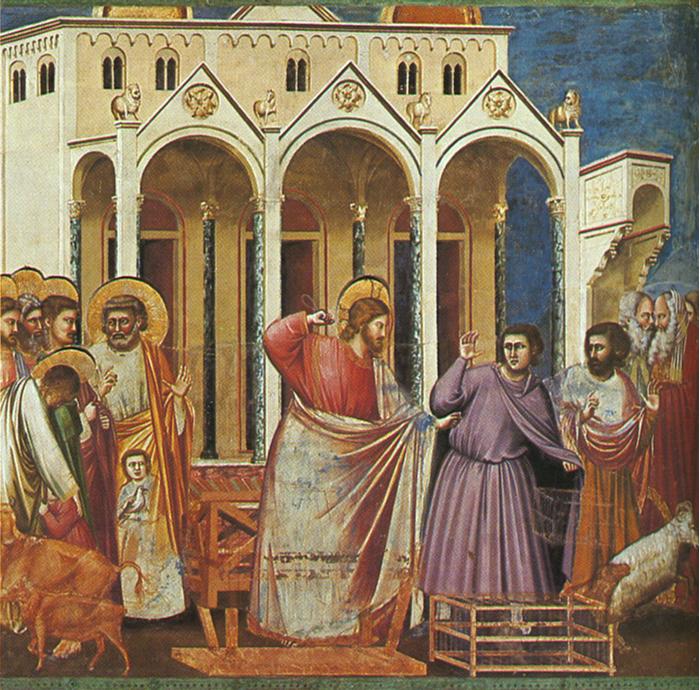Today's Gospel reading from St. John presents us with the account of Jesus cleansing the Temple. To simply read this incident of one where Jesus is trying to protect the people from price gouging is to miss the Lord's actions completely. Sadly, this "theme" seems to pop up when analyzing this particular Gospel account solely through the eyes of social justice.
The Temple was divided into three sections. The first section, the smallest, was called the "Holy of Holies." This sacred space was reserved to the priest as he entered it to offer sacrifice to God on behalf of the people. In Solomon's temple, this was where the Ark of the Covenant was kept. Even though, in the second Temple, the Ark was absent, it was still the place where God made his presence known among His people. The second, larger space in the Temple was the place of prayer for the Jews. The third space was reserved for those Gentiles who came to believe in the God of Abraham, Isaac and Jacob. It was in this space where the money changers and animal vendors set up shop.
Now, the money changers and the animal vendors were necessary. One could not pay the Temple tax using Roman currency, as these coins depicted graven images (prohibited by the Commandments). Thus, the currency needed to be exchanged for something kosher. The animal vendors were necessary because it made no sense for pilgrims to bring along their animals during their trek to Jesusalem, as the birds, sheep and oxen may either be weakened by the long trip or not even survive the journey at all. One needed to present a healthy, unblemished animal for sacrifice. The problem was that both the vendors and the money changers set up their stalls in an area that was sacred, reserved for prayer.
This was probably the first recorded instance of liturgical abuse in the New Testament, although, not in the Bible. One can say that this distinction belongs to Aaron and the Golden Calf. Aaron bowed under the pressure of the newly released Hebrews and fashioned a golden calf for them to worship. God severely punished Ancient Israel for this serious infraction. But, this would not be the last abuse. Aaron's sons committed the next infraction, burning incense when they were not supposed to do so. Again, the punishment was swift and fatal. The Lord did not take such abuses lightly.
If the abuses against Ancient Israel's form of cultic worship greatly concerned God the Father, God the Son also shared His Father's reaction. This is the only time in the Gospel where Jesus has such an intense and swift reaction. For Jesus, how we pray matters. How we use sacred space and sacred appointments matter. The law of prayer is the law of belief. We need to pray as we believe. It was just as true in Jesus' time as it is in our time.
For me, what was rather ironic in today's reading was what happened at Mass this afternoon. I must admit that I was undergoing an intensive migraine during most of the Mass. However, what hurt me more than the migraine was not so much that folks were streaming in late (this always happens during a time change), but, the fact that we were using substandard music. The worse part was that one of the pieces was not even suitable for the Lenten season, "Seek Ye First". Those who know the song are well aware that the chorus features the word "Alleluia", not once, but many times. Last week, the parochial vicar had to correct the choir because they had chosen another song, "Come, Let Us Worship", which had a smattering of "Alleluias", reminding them that we were already two Sundays into Lent. I am trying to give OCP the benefit of the doubt that these were not something that the publishing house had suggested for use during the Lenten season. Then, the keyboardist played an instrumental after Communion, even though, given the fact that we are in the Lenten season, the Church restricts the use of instruments to just sustaining the singing.
I do not necessarily blame those who selected the music. I blame the publishing house for suggesting that this piece, along with "Table of Plenty" be used. It's as though OCP does not have any clue regarding what sacred music is. In his homily, the celebrant stressed the need to respect the Church. At another Mass I assisted, the celebrant talked about respecting the Mass. Yet, there is a very strong disconnect between what was prayed, proclaimed and preached with what was sung in this afternoon's Mass. Certainly, God deserves better than tawdry music that, in this case, wasn't even seasonally appropriate.
In the excellent blog by the New Liturgical Movement, there was an article that raised the point about the need for a division within the Congregation for Divine Worship and the Discipline of the Sacraments that would be devoted to sacred music. While there are some who would argue that this chore would best be left to the national episcopal conferences, I do not necessarily think that such an approach would be a good thing. We need to have clear-cut guidance from the Holy See and explicit definitions to determine just what sacred music means. As I have experienced it, we don't seem to be getting it from the USCCB. Were this the case, a lot of what was sung today would not have been used.
Perhaps it is time for another cleansing of the Temple, only this time, it should begin with the choir loft.

No comments:
Post a Comment